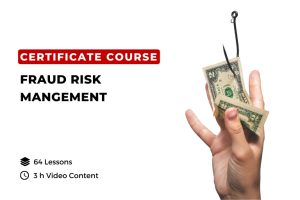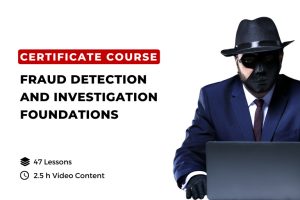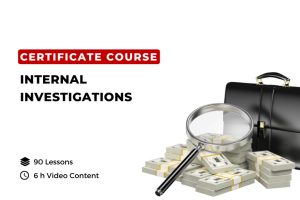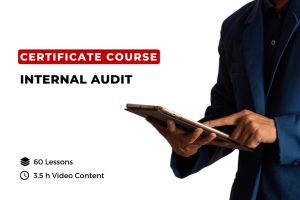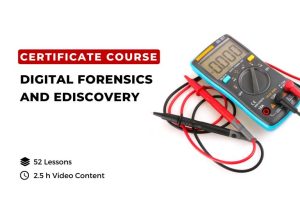
Certified Audit and Investigations Professional (CAIP)
Take your Fraud & Investigations Career to the next level and become an Audit and Investigations Professional with an Audit Certification!

Certification Description
In 1941, The Institute of Internal Auditors (IIA) was founded in New York City, USA by a small group of practicing internal auditors. The group recognized they had many commonalities in the way they worked even though they worked in different businesses and industries. The internal audit profession evolved steadily with the progress of management science after World War II. Much of the theory underlying internal auditing is derived from management consulting and public accounting professions. With the implementation of the U.S. Sarbanes-Oxley Act of 2002, the profession’s growth accelerated as internal auditing became more visible, respected, and valued.
In our Certificate Program for Audit and Investigations Professional (CAIP), you will learn how to conduct a thorough investigation of a corporation or business to uncover wrongdoing committed by management, employees, or third parties.
Finish all the internal audit courses in this learning path while maintaining active membership to get the CAIP certificate!
Learning Path
What You Will Get From This Certification
In-demand Skills
Gain the relevant knowledge to ensure that you are supporting your firm and progressing your internal auditor career.
Career Credential
Get a certificate from the FCA Financial Crime Academy.
Flexibility
Study on-demand and at your own time and pace, regardless of where you are in the world with this flexible online course.
Global Community
Get access to our exclusive LinkedIn group with 1,500+ like-minded professionals and experts.
Certification Material
Download supplementary online auditing course material such as the comprehensive course study guide.
Quiz Questions
Test your knowledge with multiple-choice questions and determine which skills you have mastered!
Certification Overview
- Understand the historical development and evolution of the internal audit profession, tracing its origins to the founding of The Institute of Internal Auditors (IIA) in 1941.
- Recognize the commonalities shared by practicing internal auditors, despite working in diverse businesses and industries, and the impact of management science on the evolution of the profession after World War II.
- Comprehend the theoretical foundations of internal auditing, derived from management consulting and public accounting professions, and their influence on the practices within the internal audit field.
- Explore the core principles and methodologies employed in conducting thorough investigations of corporations or businesses to uncover wrongdoing committed by management, employees, or third parties.
- Acquire practical skills and techniques for effectively carrying out audits and investigations within a corporate or business setting.
- Understand the ethical considerations and professional standards that guide audit and investigation professionals in their work.
- Learn how to identify and evaluate evidence of wrongdoing, including fraudulent activities, during an audit or investigation process.
- Develop proficiency in reporting findings and communicating investigative results clearly and concisely to relevant stakeholders.
- Demonstrate a comprehensive understanding of the key responsibilities and competencies required for an Audit and Investigations Professional, aligning with industry standards and best practices.
Designed for those who need to understand the fundamentals of the subject area and recognize key issues, particularly relating to risk.
Compliance professionals that want to acquire a solid understanding of Blockchain and Cryptocurrency Risk Management.
Risk management professionals that want to effectively manage Cryptoassets and Cryptocurrency Risks.
Ambitious risk management and compliance personnel looking to broaden knowledge and skills related to Blockchain and Cryptocurrency Risk Management.
Career starters seeking career opportunities in the risk management industry.
For participating in this Audit and Investigations Certificate Program, you will need an electronic device with online video-viewing capabilities (e.g., smartphone, tablet, laptop, desktop computer, etc.). You will need no previous knowledge in compliance or anti-financial crime, although this is helpful. A background in business, legal, or finance might also be beneficial but is not required.
This CAIP Certification Program is presented entirely online. Modules can be completed in your own time and at your own pace. This interactive, supportive teaching model is designed for busy professionals and results in unprecedented certification rates for Certification Programs.
What our students are saying
Frequently Asked Questions
An audit professional plays a critical role in examining an organization's financial operations. They assess financial records, transactions, and internal controls to ensure accuracy, transparency, and compliance with laws and regulations. Their primary objectives include identifying potential financial errors, fraud, or irregularities and providing recommendations for improvements. Audit professionals are essential for maintaining financial integrity, transparency, and accountability within businesses and institutions.
Investigative auditors are responsible for conducting in-depth examinations of financial records and transactions to uncover fraud, misconduct, or irregularities within an organization. They gather evidence, analyze data, and collaborate with law enforcement or legal authorities when necessary to support investigations and ensure compliance with regulations.
Auditors in fraud detection and investigation examine financial records and internal controls to uncover irregularities and suspicious activities. They gather evidence, report their findings to management and authorities, collaborate with law enforcement when necessary, and recommend preventive measures to mitigate future fraud risks. Their role is to ensure financial integrity and compliance while addressing and preventing fraud within organizations.
The objectives of fraud investigation encompass identifying instances of fraud, collecting supporting evidence, pinpointing responsible individuals, recovering assets if possible, suggesting prevention measures, and facilitating legal actions as needed.
This Audit Certification Program is presented entirely online. Modules can be completed in your own time and at your own pace. This interactive, supportive teaching model is designed for busy professionals and results in unprecedented certification rates for Certification Programs.
The CAIP certification is perpetual and does not require renewal or recertification exams. Once earned, it stands as a permanent testament to one's anti-financial crime expertise.
Absolutely! All the files (including study guide, audiobook, course slides, etc.) in a course are available for download. Just look for a module that shows the files within a course.
You will have yearly access to the courses as long as you maintain an active subscription. All the courses are self-paced as well so you can take your time in learning without worrying about any deadlines.
Check our Frequently Asked Questions Page.
30 Learning Hours
Downloadable Resources
Extensive Template and Policy Library
Certifications
Share
Download Syllabus
Do you want to learn more? Download the syllabus to get in-depth insights into your learning journey.
Learn In-Demand Skills with On-Demand Courses
Gain the relevant skills and knowledge to ensure that you are supporting your firm and progressing your career.

